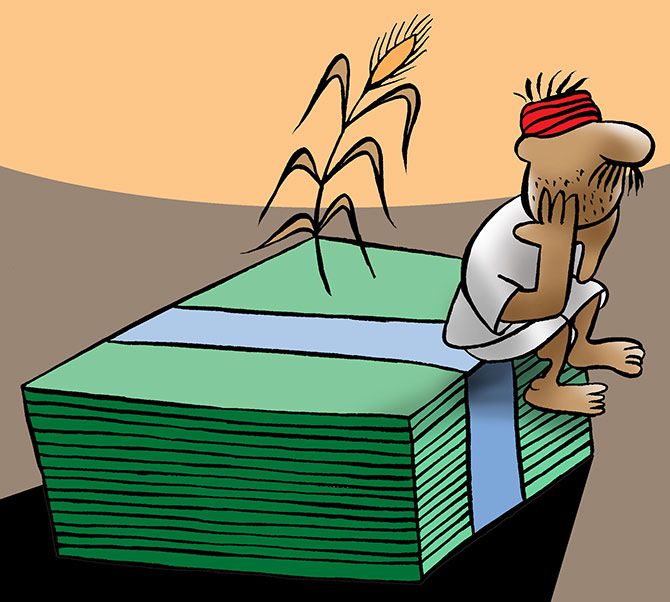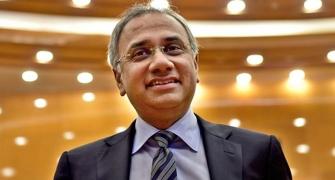Under the PMFBY - introduced in 2016 - farmers have to pay a maximum of 2 per cent of the sum insured for kharif and 1.5 per cent for rabi food and oilseed crops and 5 per cent for commercial/horticultural crops.
Eighteen general insurance companies, including five public sector insurance firms, have been empanelled for the scheme’s implementation.
Illustration: Uttam Ghosh/Rediff.com

The government is considering creating a pool mechanism for claim settlements because insurance and reinsurance firms, foreign and private, are turning out to be big beneficiaries of premiums collected under the Pradhan Mantri Fasal Bima Yojna (PMFBY).
In the last six seasons, foreign reinsurers received Rs 5,000 crore as the claim ratio has been just around 77 per cent.
This has led the government to rethink the involvement of reinsurance companies, a senior government official said.
The data from the Press Information Bureau (PIB) corroborates this.
In 2016-17 and 2017-18, the premium collected under the PMFBY was about Rs 48,267 crore, while the claim payout was about Rs 39,789 crore, indicating that close to Rs 9,000 crore went to insurance and reinsurance firms.
Of the premium, about Rs 8,720 crore was paid by farmers, while close to Rs 39,547 crore was subsidised by the central and state governments.
“The pool mechanism will help the money stay in the country itself, instead of going to foreign reinsurers,” said the official.
Under the proposed pool mechanism, while private firms can retain a small part of the premium, a large part goes to the pool, which will serve to pay out the claims.
While initial years, when the pool is small, proposals such as budgetary support from the government, in case the claim ratio exceeds 100 per cent, is also being discussed.
At present, about 25 per cent of the risk - the premium from the scheme - is retained by insurance companies, while the rest is hived-off to reinsurance companies.
About 50 per cent of the risk is reinsured by state-owned GIC, and the rest by international reinsurer firms.
Thus, with claim ratio well below 100 per cent, a large part of profit from the scheme at present accrues to foreign reinsurers.
“The new model should be sustainable in the long run,” according to a top official in a private insurance company.
Under the PMFBY - introduced in 2016 - farmers have to pay a maximum of 2 per cent of the sum insured for kharif and 1.5 per cent for rabi food and oilseed crops and 5 per cent for commercial/horticultural crops.
The remaining part of actuarial premium is shared equally between the central and state governments.
The PMFBY is based on actuarial calculations, and rates are based on risk perception.
Thus, premiums differ, based on crops and regions.
For example, in drought-prone areas, the premiums are generally higher, and the payouts are also high.
Insurance companies get the benefit of volumes, by getting premium from other regions, where the cropping pattern is generally stable.
Eighteen general insurance companies, including five public sector insurance firms, have been empanelled for the scheme’s implementation.










